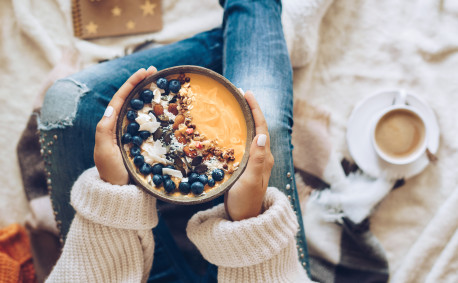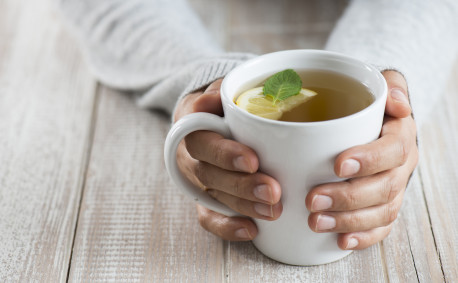Good Foods to Boost Your Mood
Being healthy is about more than just physical strength and stamina. Emotional and mental health are an important part of our overall wellness. If you’re feeling blue or even suffering from clinical depression, there are certain things you can do that may improve your mood. Getting enough sleep, drinking plenty of water, exercising, spending time with loved ones and enjoying hobbies have all been shown to reduce depression and anxiety. What you eat can also make a difference. Certain nutrients have been shown to help reduce the severity and duration of feelings of sadness and depression.
Brain Chemicals
Before we get to those mood-boosting foods, let’s take a look at how emotions, chemicals and nutrients are interconnected.
Several brain chemicals play a key role in how we process moods and foods.
- Dopamine, norepinephrine, serotonin and gamma aminobutyric acid (GABA) are neurotransmitters linked to mood. High levels can improve moods, reduce depression and improve our ability to manage stress.
- Endorphins, often released during exercise, provide a natural high, but low levels can cause food cravings for sugars and other simple carbohydrates that can cause energy spikes and dips.
- Neuropeptides and galanin are also triggered by stress and cause cravings for carbs.
You can probably think of a time when you’ve felt sad or anxious and reached for a sweet treat to feel better. We know we have! Depression often triggers cravings for sugary foods. Sugar provides a quick boost of energy. It also causes your body to produce serotonin and possibly endorphins, both of which are associated with elevated moods. But this temporary fix can backfire when your blood sugar drops, making you feel even worse and wanting to reach for more sugar to boost your energy. It’s a tough cycle because depression makes you crave foods that will increase your depression in the long run. Sugar can also cause inflammation, which has been linked to depression.
Your brain isn’t the only player in the mood-food connection. New research on gut microbiomes points to the importance of its relationship with the brain and emotions. Not only does your gut produce serotonin, but healthy gut bacteria has also been linked to lower depression rates. Prebiotics and probiotics — think yogurt, kefir, sauerkraut and other fermented foods — can help improve your gut health.
Feel-Good Nutrients
So, how can you feed your feelings in a helpful way? Just like moods can release chemicals that trigger cravings for certain foods, other foods can help your body produce chemicals that can combat those moods. It’s all about the nutrients!
If your diet is low in these important nutrients, check with a doctor about incorporating more foods that are rich in amino acids, omega-3 fatty acids, vitamins and minerals.
Amino Acids
How They Work
Tryptophan, tyrosine and phenylalanine are three amino acids linked to feel-good brain chemicals. Your body can convert tryptophan to serotonin, which has a relaxing effect. (Thanksgiving day naps, anyone?) Tyrosine and phenylalanine produce dopamine and norepinephrine.
What to Eat
Proteins, protein, proteins! Your body produces certain amino acids on its own. Others, including tryptophan and phenylalanine, can only come from food. Try these foods for great sources of mood-boosting amino acids:
- Beans and lentils
- Eggs
- Meat (beef, pork, poultry)
- Milk and dairy products
- Peas
- Soy products
- Spinach
- Whole grains
Omega-3 Fatty Acids
How They Work
Many studies have shown omega-3 fatty acids can help reduce depression. These nutritional powerhouses help you produce dopamine and serotonin, which — you guessed it — help you regulate mood.
What to Eat
Look for eicosapentaenoic acid (EPA) and docosahexanoic acid (DHA). They are commonly found in fatty fish, but give any of these foods a try to help boost your levels:
- Chia seeds
- Flax seeds
- Salmon
- Sardines
- Trout
- Tuna
- Walnuts
Vitamins and Minerals
How They Work
Vitamins and minerals have a host of benefits, including helping to manage depression.
- B-complex vitamins: Studies have shown these can help improve mood and improve brain function.
- Iodine: Iodine helps the body produce thyroid hormone, which helps with the metabolism of brain cells.
- Iron: Iron helps the body produce neurotransmitters and iron deficiency has been linked to depression, apathy and fatigue.
- Magnesium: On its own, magnesium can help improve sleep and reduce anxiety. When combined with vitamin B12, it has been shown to help reduce depression.
- Zinc: Zinc helps protect brain cells from free radicals, reactive molecules that cause oxidative stress in the body. Additionally, low zinc levels have been connected to clinical depression.
What to Eat
To pack these nutrients in your diet, you can try a supplement or incorporate some of these foods:
- Beans and legumes
- Citrus fruits
- Eggs
- Fish and seafood like salmon, sardines, oysters
- Leafy greens
- Meat (beef, pork, poultry)
- Milk and other dairy products
- Nuts and seeds
- Seaweed
- Whole grains
Because there’s a lot of overlap of foods with amino acids, omega-3 fatty acids, vitamins and minerals, it’s pretty easy to incorporate a variety of foods into meals and snacks. Speaking of variety, it’s important to make room for all kinds of foods in your diet — including sugars. That’s right. You don’t have to ban entire foods groups. A well-balanced diet is just that — balanced. So, find joy in what you eat by including some of these nutrient-dense options to elevate your body and mind.
This article is for informational purposes only and is not intended to serve as professional advice, diagnosis or treatment. If you are struggling with depression or other mental health issues, seek the advice of a mental health professional. If you are having thoughts of harming yourself, call the National Suicide Prevention Lifeline at 800-273-8255. You matter.
More Foods to Help You Feel Your Best





